Israel’s strikes on Iranian nuclear facilities have alarmed none more than Russia, the country that first brought nuclear power to Iran in defiance of Western objections.
We’re “millimeters from catastrophe,” said Kremlin spokeswoman Maria Zakharova on June 18 in response to a bombing campaign that Israel launched against Iran on June 13.
Decades of conflict with the West have united Iran and Russia, despite a cultural gulf between the two nations that dwarfs the Caspian Sea that physically divides them.
Russia has spent the past decade backing Iran-aligned regimes and militia groups throughout the Middle East. Most famous is Bashar al-Assad, a longtime dictator in Syria, on whose behalf Russia began actively fighting against rebels back in 2015. Assad fell in December.
"We're dealing with the domino effects of those changes," Anna Borshchevskaya, a senior fellow at the Washington Institute focusing on Russia's policy toward the Middle East, told the Kyiv Independent.
"In my view, the Russians were not just mere opportunists. They weren't just hedging their bets. They weren't just watching on the sidelines. They were actively fueling chaos across the Middle East."
"Of course, they've (Iran and Russia) had such extensive nuclear cooperation because it was Russia that built the Bushehr nuclear reactor in the first place."
In addition to a broad sense of being at war with the West, nuclear energy is a rare concrete tie joining Russia and Iran, alongside the arms trade and a shared interest in dodging sanctions on fossil fuels. Strikes on Iranian nuclear facilities are, for Russia, personal.
"Of course, they've had such extensive nuclear cooperation because it was Russia that built the Bushehr nuclear reactor in the first place," said Borshchevskaya.
Opened in 2007 and providing power by 2010, Bushehr is to date the only functioning nuclear power plant in Iran. Originally a project by German company Siemens, construction was on hold for decades following the toppling of the Shah in 1979. Built and maintained by Russia, it was the first nuclear reactor in the Middle East.
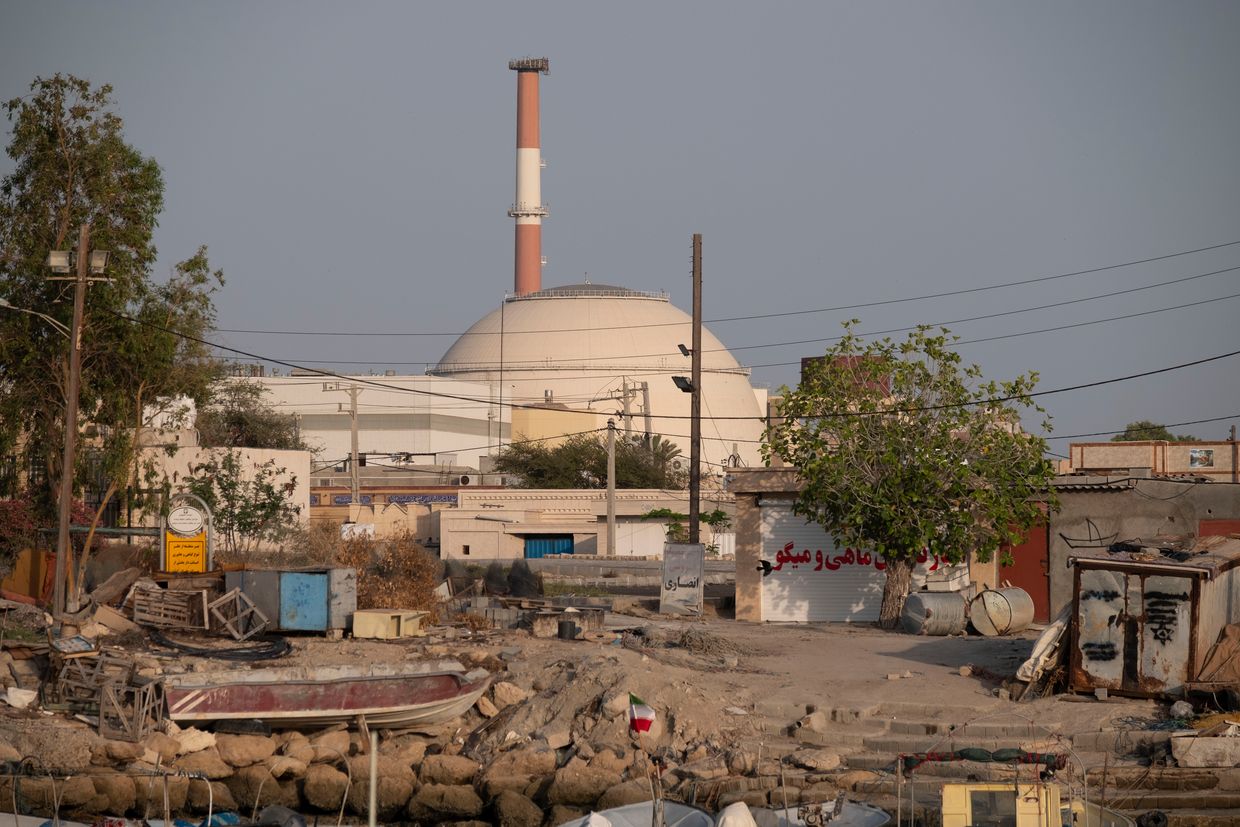 The Bushehr nuclear power plant is seen in a coastal village in Bushehr province, Iran, on April 29, 2024. (Morteza Nikoubazl / NurPhoto via Getty Images)
The Bushehr nuclear power plant is seen in a coastal village in Bushehr province, Iran, on April 29, 2024. (Morteza Nikoubazl / NurPhoto via Getty Images)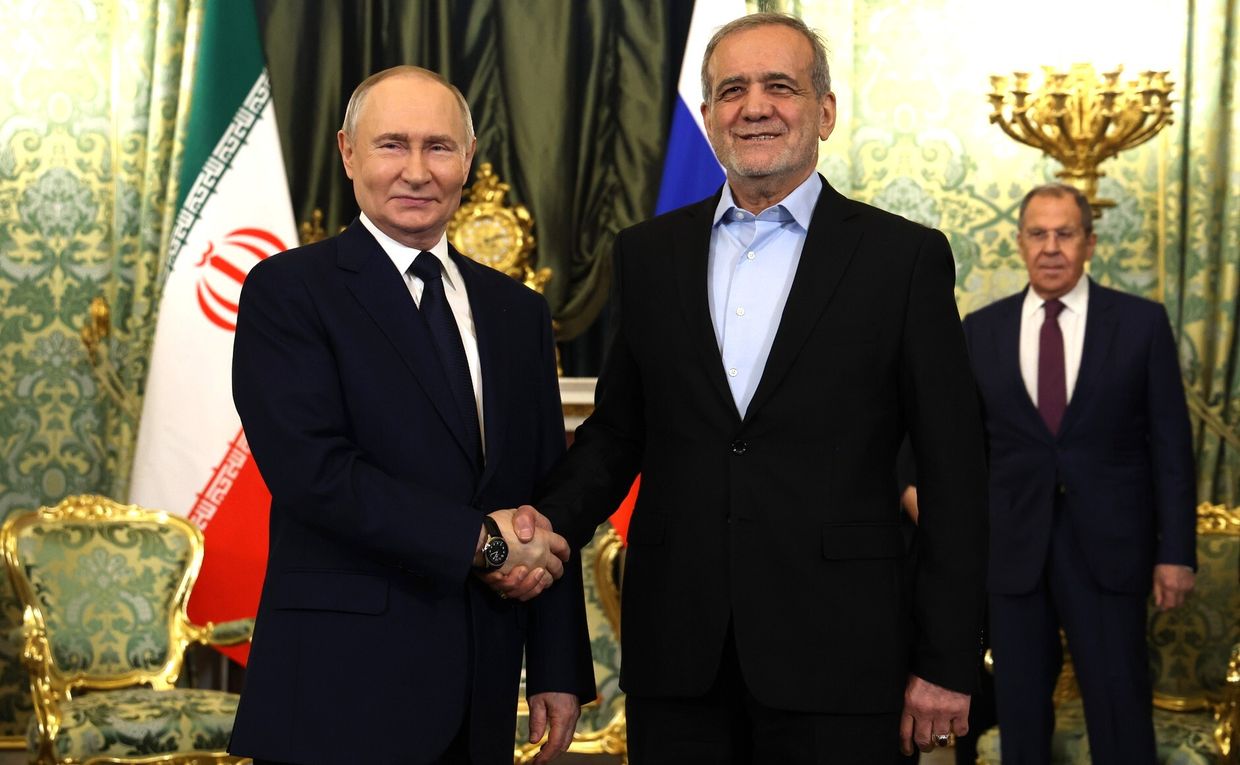 Russian President Vladimir Putin (L) meets with Iranian President Masoud Pezeshkian (R) on Jan. 17, 2025. (Kremlin Press Office / Handout / Anadolu via Getty Images)
Russian President Vladimir Putin (L) meets with Iranian President Masoud Pezeshkian (R) on Jan. 17, 2025. (Kremlin Press Office / Handout / Anadolu via Getty Images)
On June 19, Russian President Vladimir Putin announced that he had agreed with Israel as to the safety of the "over 200" specialists working at Bushehr on behalf of the Russian nuclear agency Rosatom.
The same day, Rosatom Head Aleksei Likhachov said at a conference in St. Petersburg that the agency had evacuated “tens” of their employees from Bushehr and were weighing a full evacuation, Russian news outlet Interfax reported.
Bushehr has yet to fall under Israeli strikes, at least in part because that would be a nuclear disaster.
The West stonewalled the Bushehr plant that Russia ultimately built out of concern that at least expertise, if not materials, would be redirected to Iranian nuclear weaponry. But Russia wanted a sale. Experts note that the uranium that Iran uses at its enrichment sites is separate from Bushehr, where Russia holds a monopoly.
But why Iran would pay Russia to build Bushehr and supply all of its uranium, as it does to this day, is an odd arrangement given that the oil and gas-rich Iran has little real need for nuclear energy.
"It is dubious to say that the reason why (Iran) did so is because they were absolutely desperate for having a nuclear power program. It is my belief that they did it to have a weapons program," Richard Nephew, a senior research scholar at Columbia University’s energy program and former U.S. President Joe Biden’s special envoy to Iran said to the Kyiv Independent.
John Erath, senior policy director for the Center for Arms Control and Non-Proliferation, echoed the sentiment.
“There was some question as to why they would build a nuclear power plant at great expense when they had no room for energy. I think the motives were pretty clear: Iran wanted experience with the technologies. They wanted to develop greater technical expertise and manage nuclear materials,” Erath told the Kyiv Independent. He maintained, however, that “Bushehr doesn’t have a role in the weapons program.”
Bushehr is the primary site of Russia’s nuclear engagement with Iran. But as a result of its ties as well as its position on the UN Security Council, Russia became a primary broker of the Barack Obama administration’s Joint Comprehensive Plan of Action, or JCPOA, colloquially the Iran nuclear deal.
The nuclear enrichment site that Israel is asking for U.S. aid in blowing up is Fordow, built under the mountains outside the city of Qom.
Nephew reminds that per the JCPOA, Russia was supposed to convert the Fordow plant from an enrichment facility to a “stable isotope separation plant.”
Experts interviewed by the Kyiv Independent all maintained that Russia was to all appearances a fair broker of the JCPOA in Iran. But it illustrates the resilience of Russia’s nuclear soft power and hard economics.
Kazakhstan is by far the largest source of uranium in the world. Russia, in turn, remains the largest seller of enriched uranium in the world, even as the European Union struggles to break free of energy dependence on Russian fossil fuels.
The equipment and even the fuel that goes into nuclear power plants are far less replaceable than oil and gas, providing an economic umbilical cord to Russia.
“Neither of them needs each other for the thing they primarily export, so it's all secondary stuff, and that secondary stuff is nuclear and arms,“ said Nephew.
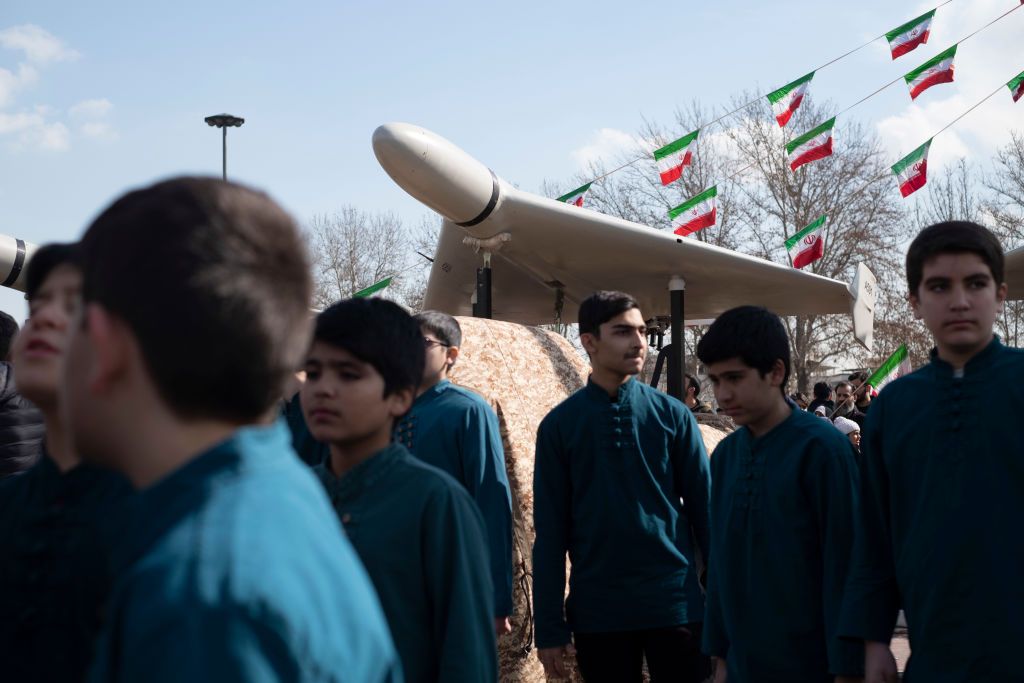 Iranian youth stand under an Iranian-made Shahed-136 unmanned aerial vehicle in Tehran, Iran, on Feb. 11, 2023. (Morteza Nikoubazl / NurPhoto / Getty Images)
Iranian youth stand under an Iranian-made Shahed-136 unmanned aerial vehicle in Tehran, Iran, on Feb. 11, 2023. (Morteza Nikoubazl / NurPhoto / Getty Images)
One infamous example is Iran’s Shahed drones, which Russia began importing and firing at Ukraine near the end of 2022. Russia has since made more and more of its own copy, the Geran.
For Russia, nuclear generation and the prestige of being one of the few nations that can build nuclear reactors have been a rare source of geopolitical soft power, including the JCPOA.
Even U.S. President Donald Trump recently floated the idea of Russian President Vladimir Putin functioning as a mediator between Iran and Israel, which he subsequently backtracked.
Rosatom, Russia’s nuclear agency, announced the construction of another nuclear plant in Iran in 2019. And on June 9 of this year, news broke that Iran’s nuclear agency had inked a contract with Rosatom for eight more reactors, including four at Bashehr. On June 13, Israel’s strikes began.
Even without Israel attacking, experts were doubtful that Russia would build these new plants. Their announcement was, rather, a "symbolic" gesture of support.
"They want to show cooperation with Russia," said Erath. "The nuclear power sector is something that's important to the Russian government. It's one of the areas that they export that has high value, that the Russians still are exporting, profiting from, when the rest of their economy is in big trouble."
Note from the author:
Hi, this is Kollen, the author of the article. Thank you for reading. The Kyiv Independent doesn’t have a wealthy owner or a paywall. Instead, we rely on readers like you to keep our journalism funded.
We’re now aiming to grow our community that has reached 20,000 paying members — if you liked this story, consider joining our community today.
Read also: There’s loads of video of Israeli air defenses, and none of Ukraine’s — this is why
From The Kyiv Independent - News from Ukraine, Eastern Europe via this RSS feed
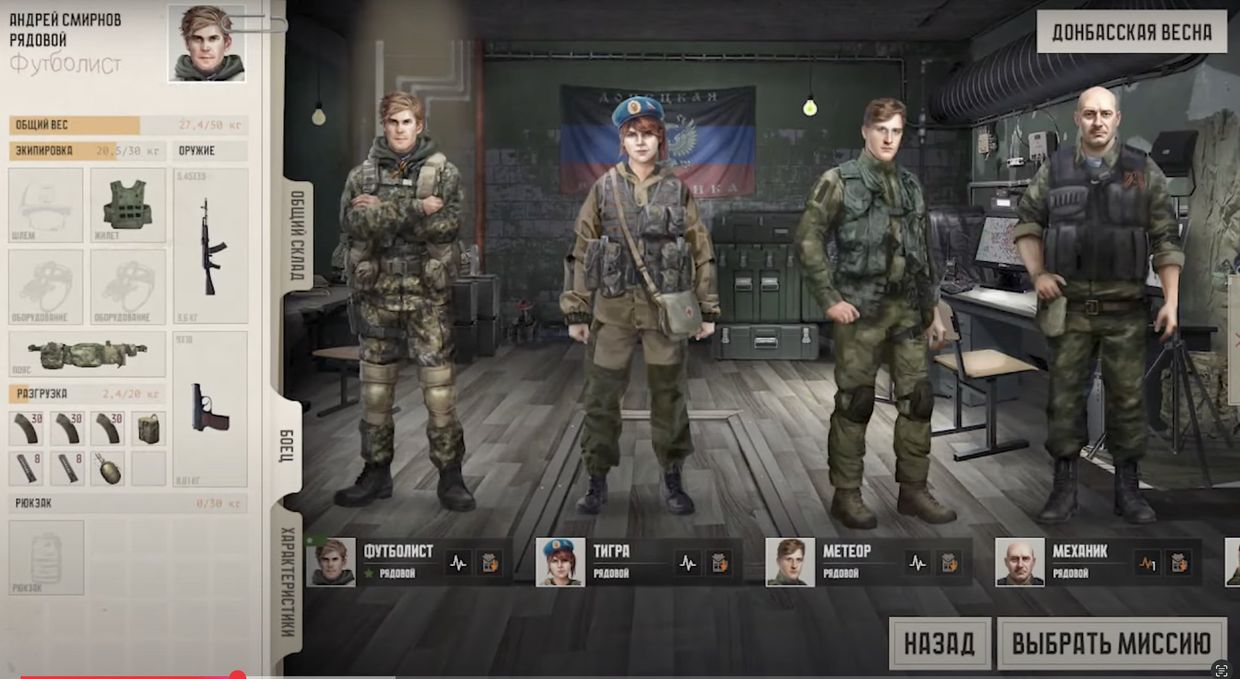 Character selection screen from Squad 22: ZOV - the game whitewashes Russian war crimes and promotes anti-Ukrainian narratives. (X)
Character selection screen from Squad 22: ZOV - the game whitewashes Russian war crimes and promotes anti-Ukrainian narratives. (X)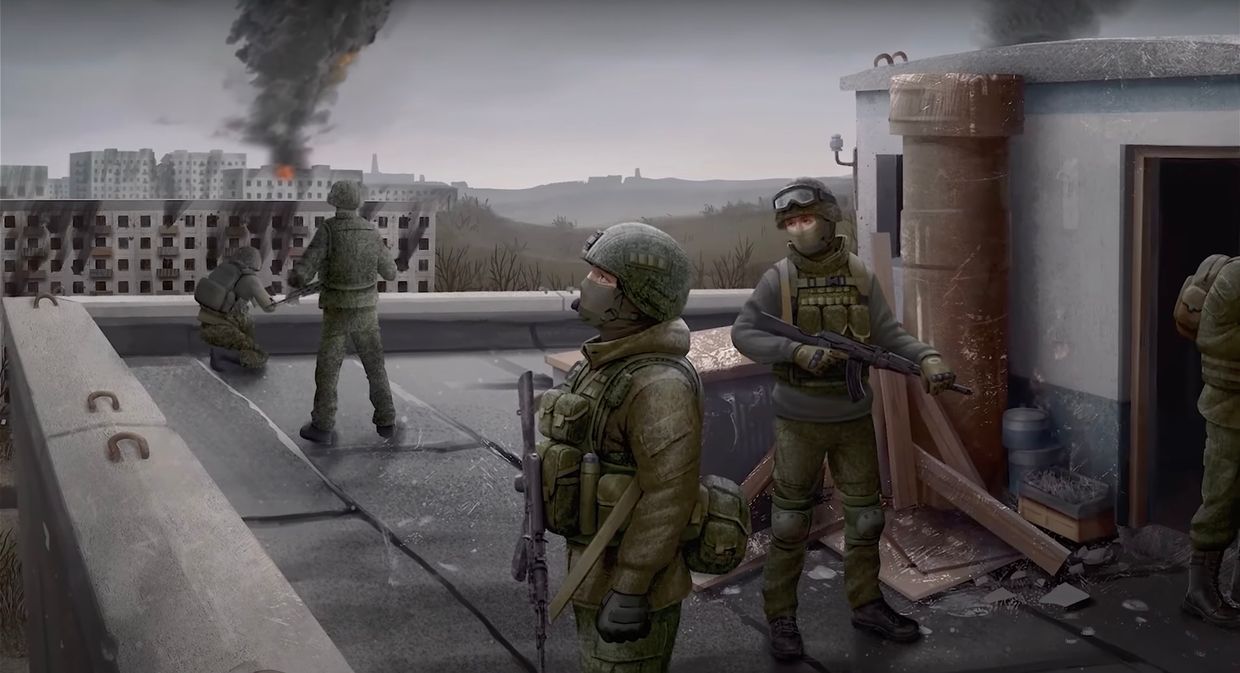 Artwork from Squad 22: ZOV depicts Russian troops overlooking a burning Ukrainian city. (X)
Artwork from Squad 22: ZOV depicts Russian troops overlooking a burning Ukrainian city. (X) The Bushehr nuclear power plant is seen in a coastal village in Bushehr province, Iran, on April 29, 2024. (Morteza Nikoubazl / NurPhoto via Getty Images)
The Bushehr nuclear power plant is seen in a coastal village in Bushehr province, Iran, on April 29, 2024. (Morteza Nikoubazl / NurPhoto via Getty Images) Russian President Vladimir Putin (L) meets with Iranian President Masoud Pezeshkian (R) on Jan. 17, 2025. (Kremlin Press Office / Handout / Anadolu via Getty Images)
Russian President Vladimir Putin (L) meets with Iranian President Masoud Pezeshkian (R) on Jan. 17, 2025. (Kremlin Press Office / Handout / Anadolu via Getty Images) Iranian youth stand under an Iranian-made Shahed-136 unmanned aerial vehicle in Tehran, Iran, on Feb. 11, 2023. (Morteza Nikoubazl / NurPhoto / Getty Images)
Iranian youth stand under an Iranian-made Shahed-136 unmanned aerial vehicle in Tehran, Iran, on Feb. 11, 2023. (Morteza Nikoubazl / NurPhoto / Getty Images)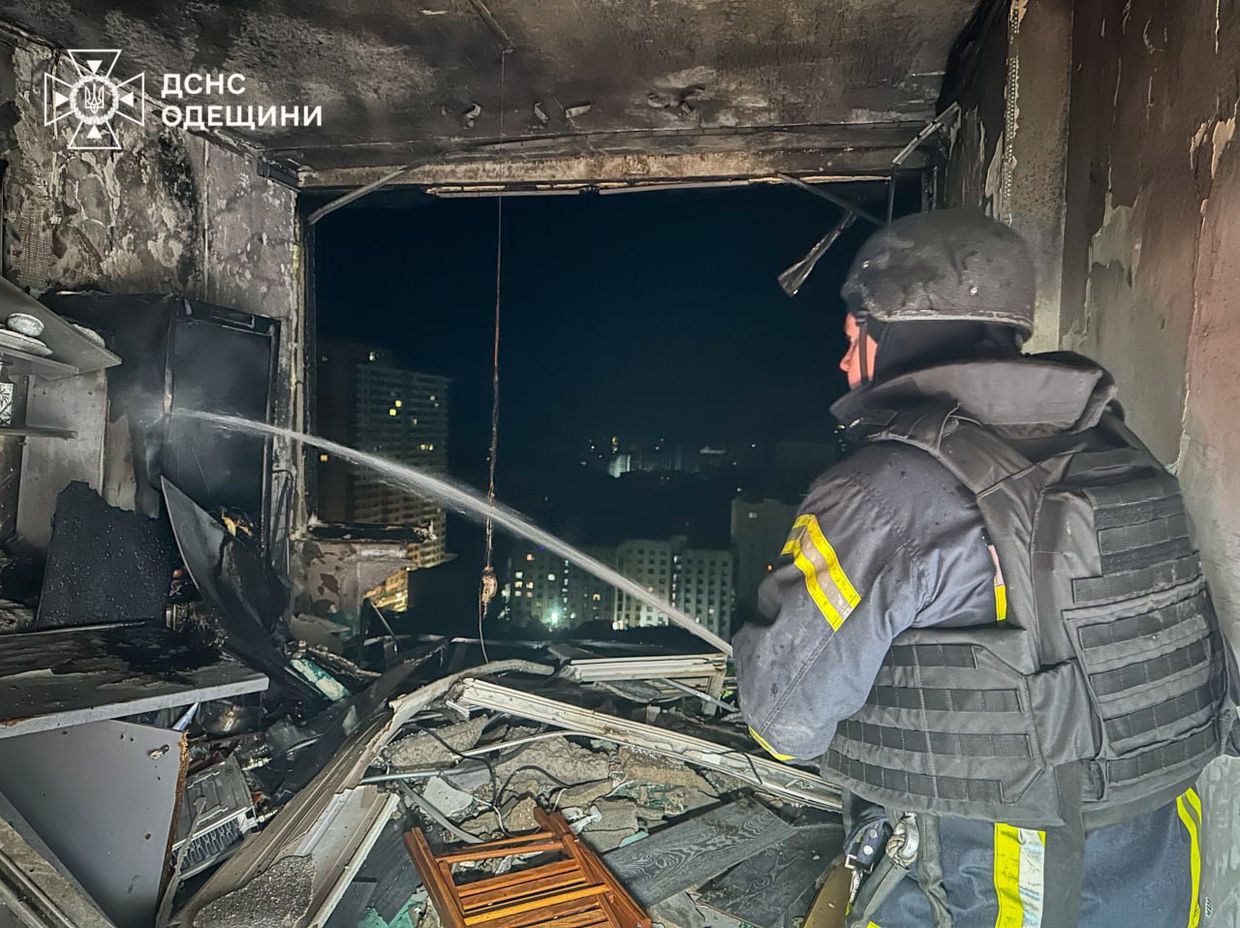 Firefighters extinguish a fire at a residential building in Odesa on June 20, 2025 following a Russian drone attack that injured at least 13 people, including three firefighters. (Ukraine State Emergency Service/Telegram)
Firefighters extinguish a fire at a residential building in Odesa on June 20, 2025 following a Russian drone attack that injured at least 13 people, including three firefighters. (Ukraine State Emergency Service/Telegram)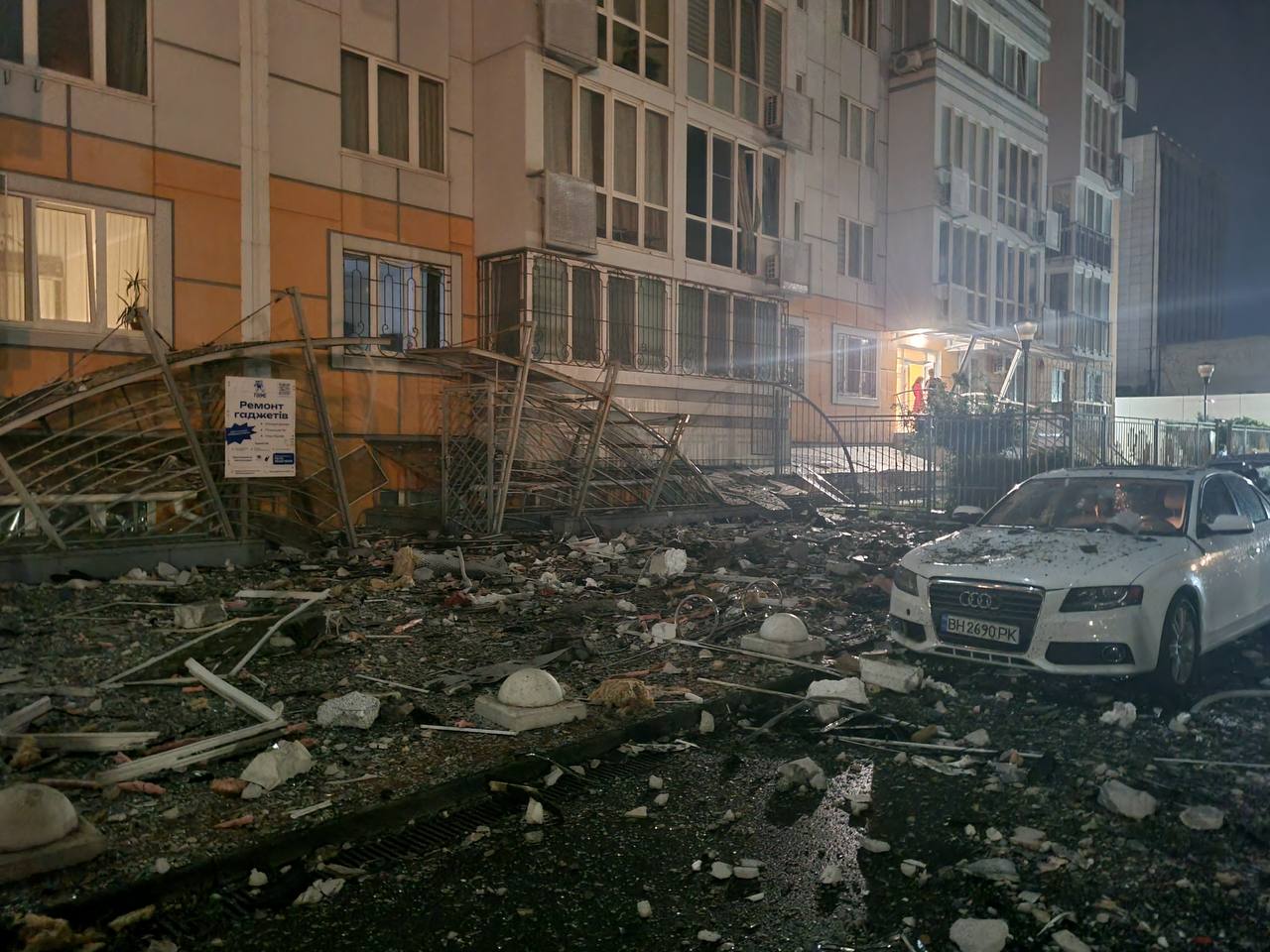 The aftermath of a Russian drone attack on a residential building in Odesa on June 20, 2025. The attacks on the city injured at least 13 people, including three firefighters. (Odesa Oblast Governor Oleh Kiper/Telegram)
The aftermath of a Russian drone attack on a residential building in Odesa on June 20, 2025. The attacks on the city injured at least 13 people, including three firefighters. (Odesa Oblast Governor Oleh Kiper/Telegram)